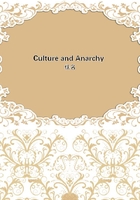
第33章
6 Still the aristocratic class is so important in itself, and the weighty functions which Mr. Carlyle proposes at the present critical time to commit to it must add so much to its importance, that it seems neglectful, and a strong instance of that want of coherent philosophic method for which Mr. Frederic Harrison blames me, to leave the aristocratic class so much without notice and denomination. It may be thought that the characteristic which I have occasionally mentioned as proper to aristocracies,--their natural inaccessibility, as children of the established fact, to ideas,--points to our extending to this class also the designation of Philistines; the Philistine being, as is well known, the enemy of the children of light or servants of the idea. Nevertheless, there seems to be an inconvenience in thus giving one and the same designation to two very different classes;and besides, if we look into the thing closely, we shall find that the term Philistine conveys a sense which makes it more peculiarly appropriate to our middle class than to our aristocratic. For Philistine gives the notion of something particularly stiff-necked and perverse in the resistance to light and its children; and therein it specially suits our middle class, who not only do not pursue sweetness and light, but who even prefer to them that sort of machinery of business, chapels, tea-meetings, and addresses from Mr. Murphy, which makes up the dismal and illiberal life on which I have so often touched. But the aristocratic class has actually, as we have seen, in its well-known politeness, a kind of image or shadow of sweetness;and as for light, if it does not pursue light, it is not that it perversely cherishes some dismal and illiberal existence in preference to light, but it is lured off from following light by those mighty and eternal seducers of our race which weave for this class their most irresistible charms,--by worldly splendour, security, power and pleasure. These seducers are exterior goods, but in a way they are goods; and he who is hindered by them from caring for light and ideas, is not so much doing what is perverse as what is too natural.
7 Keeping this in view, I have in my own mind often indulged myself with the fancy of employing, in order to designate our aristocratic class, the name of The Barbarians . The Barbarians, to whom we all owe so much, and who reinvigorated and renewed our worn-out Europe, had, as is well known, eminent merits; and in this country, where we are for the most part sprung from the Barbarians, we have never had the prejudice against them which prevails among the races of Latin origin.
The Barbarians brought with them that staunch individualism, as the modern phrase is, and that passion for doing as one likes, for the assertion of personal liberty, which appears to Mr. Bright the central idea of English life, and of which we have, at any rate, a very rich supply. The stronghold and natural seat of this passion was in the nobles of whom our aristocratic class are the inheritors; and this class, accordingly, have signally manifested it, and have done much by their example to recommend it to the body of the nation, who already, indeed, had it in their blood. The Barbarians, again, had the passion for field-sports; and they have handed it on to our aristocratic class, who of this passion too, as of the passion for asserting one's personal liberty, are the great natural stronghold. The care of the Barbarians for the body, and for all manly exercises; the vigour, good looks, and fine complexion which they acquired and perpetuated in their families by these means,--all this may be observed still in our aristocratic class. The chivalry of the Barbarians, with its characteristics of high spirit, choice manners, and distinguished bearing,--what is this but the attractive commencement of the politeness of our aristocratic class? In some Barbarian noble, no doubt, one would have admired, if one could have been then alive to see it, the rudiments of our politest peer. Only, all this culture (to call it by that name) of the Barbarians was an exterior culture mainly. It consisted principally in outward gifts and graces, in looks, manners, accomplishments, prowess. The chief inward gifts which had part in it were the most exterior, so to speak, of inward gifts, those which come nearest to outward ones; they were courage, a high spirit, self-confidence.
Far within, and unawakened, lay a whole range of powers of thought and feeling, to which these interesting productions of nature had, from the circumstances of their life, no access. Making allowances for the difference of the times, surely we can observe precisely the same thing now in our aristocratic class. In general its culture is exterior chiefly; all the exterior graces and accomplishments, and the more external of the inward virtues, seem to be principally its portion. It now, of course, cannot but be often in contact with those studies by which, from the world of thought and feeling, true culture teaches us to fetch sweetness and light;but its hold upon these very studies appears remarkably external, and unable to exert any deep power upon its spirit. Therefore the one insufficiency which we noted in the perfect mean of this class was an insufficiency of light. And owing to the same causes, does not a subtle criticism lead us to make, even on the good looks and politeness of our aristocratic class, and of even the most fascinating half of that class, the feminine half, the one qualifying remark, that in these charming gifts there should perhaps be, for ideal perfection, a shade more soul?